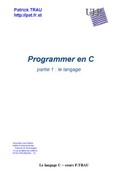Le langage C est un langage de programmation qui est impératif et généraliste. Il a été inventé dans les années 70 et est toujours utilisé dans le domaine de la programmation système et la robotique. C’est d’ailleurs l’un des langages les plus utilisés. Il offre la possibilité de créer des programmes très puissants et est privilégié par de nombreux développeurs. Le langage C présente plusieurs atouts dans la mesure où il s’agit avant tout d’un langage qui comporte des instructions et des structures de haut niveau.
Ce qu’il faut savoir sur le langage C
Le langage C a été mis au point par D. Ritchie et par B. W. Kernighan au début des années 70. À l’époque, ils avaient pour objectif de développer un langage qui pourrait offrir la possibilité d’avoir un système d’exploitation de type UNIX portable. Depuis, il est perçu comme étant un langage incontournable. Il en a d’ailleurs inspiré beaucoup d’autres. On note des langages plus modernes tels que le C++, le C#, Java et PHP qui ont repris quelques aspects du C. Le langage C est un langage compilé. C’est-à-dire que la programmation doit être décrite par un fichier texte, que l’on appelle également fichier source, avant de pouvoir le traduire en langage machine. Le programme qui se charge d’effectuer cette opération est appelé compilateur. La compilation se fait suivant quatre (4) étapes successives : traitement par le préprocesseur, compilation, assemblage et éditions de liens.
S’introduire au langage C
Le langage C est assez simple, en tout cas pour ses bases. Chaque personne a donc la possibilité de s’introduire au C. Pour ce faire, il faudra s’équiper de certains outils. On fera allusion dans ce cas au compilateur, ainsi qu’à l’éditeur de texte. Le principal intérêt avec le langage C réside dans le fait qu’il s’agit avant tout d’un langage très portable. Sur n’importe quel système d’exploitation qui dispose d’un compilateur C (UNIX, Windows, VMS, etc.), un programme écrit en C qui respecte la norme ANSI est portable sans modifications. Le langage C reste un langage particulièrement populaire. C’est d’ailleurs la raison pour laquelle on constate qu’il est souvent enseigné lors d’études supérieures en informatique. Le langage de programmation est également caractérisé par le fait qu’il soit un langage « faiblement typé ». Cela signifie que les types de données qu’il manipule sont d’habitude très restreints et sont également proches de la représentation interne par le processeur. S’introduire au C est très facile dans la mesure où il s’agit d’un langage facile à cerner. Il n’existe que très peu d’instructions et les structures de données sont assez limitées. Les cours vous permettront d’avoir une bonne maîtrise de ce langage concis. Son apprentissage est loin d’être ardu.









